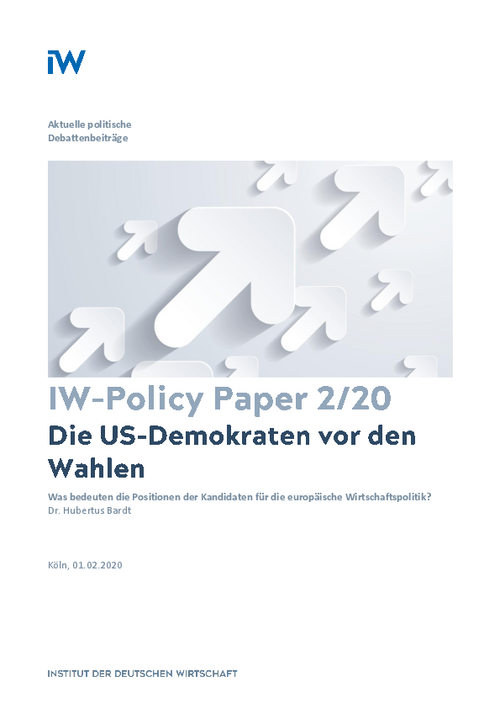The USA is at the beginning of an election year. The elections on November 3, 2020 will have a formative influence on the transatlantic relationship and on global cooperation structures in a wide range of topics.

The US Democrats Before the Elections: What do the Positions of the Candidates Mean for European Economic Policy?
IW-Policy Paper

The USA is at the beginning of an election year. The elections on November 3, 2020 will have a formative influence on the transatlantic relationship and on global cooperation structures in a wide range of topics.
It is not just a question of whether the current administration will be elected for another four years. A re-election of the current president is likely to further weaken multilateral approaches and make transatlantic cooperation more difficult. While a continuation of the previous presidency for another four years until the beginning of 2025 - despite the unpredictability of the current US administration - is likely to continue existing development trends. Changes can be expected if the government changes. However, this will not mean that the past four years can be undone, nor is a 180-degree turnaround in politics in the areas of importance for Germany and Europe realistic. How a possible administration can operate under democratic leadership essentially depends on the political positioning of a new president. Depending on which candidate the democratic party nominates after the primaries, the differences to current politics will not be that big in some areas. Particularly when it comes to free trade, there are sometimes pronounced protectionist tendencies among the democratic candidates. There will be no way back to a supposedly conflict-free cooperation - which never existed in the past. This is all the more true if a democratic president cannot rely on a majority in both houses.

Hubertus Bardt: Die US-Demokraten vor den Wahlen – Was bedeuten die Positionen der Kandidaten für die europäische Wirtschaftspolitik?
IW-Policy Paper

More on the topic
Not so Different?: Dependency of the German and Italian Industry on China Intermediate Inputs
On average the German and Italian industry display a very similar intermediate input dependence on China, whether accounting for domestic inputs or not.
IW
China’s Trade Surplus – Implications for the World and for Europe
China’s merchandise trade surplus has reached an all-time high and is likely to rise further. A key driver appears to be a policy push to further bolster Chinese domestic manufacturing production, implying the danger of significant overcapacities.
IW